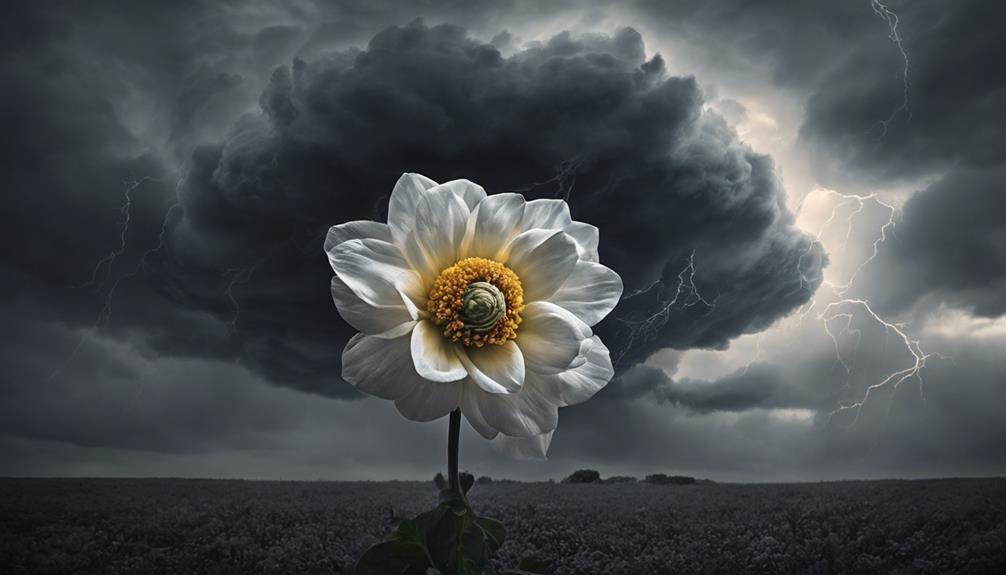In the complex interaction between empaths and narcissists, the attraction between light and darkness generates a magnetic attraction that is simultaneously entrancing and confusing.
The interplay of empathy and self-absorption sets the stage for a profoundly complex relationship dynamic that is as intriguing as it is perplexing.
As we navigate through the layers of emotional depth and psychological intricacies, we begin to unravel the tangled web of emotions and behaviors that define this unique connection.
Stay tuned to uncover the nuances and implications of this enigmatic bond that transcends conventional understanding.
Key Takeaways
- Idealization and devaluation patterns shape the empath-narcissist bond.
- Energy exchange leads to emotional depletion for empaths.
- Power imbalances foster control issues within the relationship.
- Recognizing patterns and setting boundaries are crucial for healing and growth.
The Empath and Narcissist: Defined

In psychology, the empath and narcissist are characterized as individuals with contrasting personality traits that often gravitate towards each other in relationships. Empaths are highly sensitive individuals who possess a deep sense of empathy, compassion, and understanding towards others. They're intuitive, emotionally attuned, and tend to prioritize the feelings and needs of those around them.
On the other hand, narcissists exhibit traits of self-centeredness, a grandiose sense of self-importance, and a lack of empathy for others. They often seek admiration, validation, and control in their interactions.
The dynamic between an empath and a narcissist is complex and can lead to a challenging relationship dynamic. Empaths may be drawn to the charisma and confidence of narcissists initially, while narcissists may see empaths as a source of validation and emotional support. This attraction is rooted in the empath's desire to heal and help, and the narcissist's need for admiration and attention. However, over time, this dynamic can become toxic as the empath's giving nature is exploited, leading to emotional exhaustion and imbalance in the relationship.
Attraction and Repulsion: A Paradox

Moving from the initial attraction to eventual repulsion, the empath-narcissist dynamic presents a paradoxical interplay of emotions and behaviors within the relationship. This complex interplay often leaves both parties feeling simultaneously drawn to and repelled by each other, creating a rollercoaster of emotions that can be challenging to navigate.
- Idealization and Devaluation: The narcissist's initial idealization of the empath can lead to a strong sense of attraction. However, this idealization often gives way to devaluation as the narcissist's true self emerges, causing the empath to feel repulsed by the sudden shift in treatment.
- Emotional Intensity: The intense emotional connection between the empath and the narcissist can be both alluring and overwhelming. The empath may be drawn to the intensity of the narcissist's emotions at first, only to find themselves emotionally drained and repelled by the constant turmoil.
- Cycle of Control and Freedom: The narcissist's need for control can initially feel like protection to the empath, creating a sense of security and attraction. However, as the control becomes suffocating, the empath may feel a strong urge to break free, leading to feelings of repulsion towards the narcissist's manipulative behaviors.
Energy Exchange and Emotional Turbulence

Within the empath-narcissist relationship, the exchange of energy and the resulting emotional turbulence play a crucial role in shaping the dynamics between the individuals involved. This interaction can be intense and draining for empaths, who often absorb the emotions and energy of those around them, including the narcissist. The narcissist, in turn, may seek validation and admiration from the empath, creating a cycle of emotional highs and lows that can be destabilizing.
| Energy Exchange | Impact on Empath | Impact on Narcissist |
|---|---|---|
| Empath absorbs the emotions and energy of the narcissist | Feelings of overwhelm and exhaustion | Temporary validation and admiration boost |
| Narcissist seeks validation and admiration from the empath | Momentary fulfillment of ego needs | Dependency on the empath for emotional validation |
| Mutual energy exchange | Emotional depletion for the empath | Sense of control and power for the narcissist |
Understanding this energy exchange is vital in comprehending the complex dance between empaths and narcissists, highlighting the need for healthy boundaries and self-care practices for empaths to navigate these turbulent dynamics.
Power Dynamics and Control Issues
Navigating power dynamics and control issues in an empath-narcissist relationship requires a keen awareness of the underlying dynamics at play. These relationships often involve intricate struggles for dominance and manipulation that can be emotionally draining and psychologically damaging. Understanding the power dynamics at work is crucial for both empaths and narcissists to navigate this complex dynamic effectively.
Key Points:
- Imbalance of Power: The empath often finds themselves in a position of giving more than receiving, leading to a power imbalance where the narcissist exerts control over the empath's emotions and actions.
- Manipulative Behaviors: Narcissists may use manipulation tactics such as gaslighting, guilt-tripping, or love bombing to maintain control over the empath and fulfill their own needs at the expense of the empath's well-being.
- Struggles for Control: Empaths may unintentionally enable narcissistic behavior by allowing the narcissist to dictate the terms of the relationship, perpetuating a cycle of control and power struggles.
Healing and Growth Opportunities

Exploring the potential for personal growth and healing is essential for individuals entangled in empath-narcissist relationships. These dynamics can be emotionally draining and detrimental to one's well-being. Recognizing the patterns of behavior within such relationships is the first step towards healing. Self-reflection and seeking therapy or counseling can aid in understanding one's role in the relationship and developing healthier boundaries.
Opportunities for growth often arise from the challenges faced in empath-narcissist relationships. Learning to prioritize self-care and assertiveness can lead to increased self-esteem and resilience. Connecting with support groups or individuals who've experienced similar relationships can provide validation and guidance on the healing journey.
Embracing personal development through mindfulness practices, journaling, or creative outlets can foster self-awareness and emotional regulation. It's crucial to remember that healing is a process and may require time and patience. By actively engaging in self-discovery and seeking help when needed, individuals can navigate towards a path of healing and growth beyond the confines of empath-narcissist relationships.
Frequently Asked Questions
How Can Empaths and Narcissists Work Together in a Professional Setting Without Causing Conflict?
In a professional setting, empaths and narcissists can collaborate effectively by recognizing and respecting each other's strengths and limitations.
Empaths can offer empathy and support, while narcissists can contribute decisiveness and confidence.
Setting clear boundaries, communicating openly, and focusing on shared goals can help mitigate potential conflicts.
Can an Empath and a Narcissist Have a Successful Romantic Relationship Despite Their Contrasting Personality Traits?
While it's possible for an empath and a narcissist to engage in a romantic relationship, the dynamic can be challenging. Empaths prioritize understanding and compassion, while narcissists often focus on themselves.
Despite the contrasting traits, success may be achievable through open communication, setting boundaries, and seeking professional guidance. Both parties must be willing to acknowledge and work on their differences to build a healthy and fulfilling relationship.
What Are Some Coping Strategies for Empaths Dealing With Narcissistic Abuse in Their Personal Relationships?
When coping with narcissistic abuse in personal relationships, it's vital for empaths to prioritize self-care. Setting boundaries, seeking support from trusted individuals, and engaging in activities that promote emotional well-being are key strategies.
Additionally, practicing mindfulness and self-reflection can help empaths better understand their own needs and boundaries, enabling them to navigate challenging situations with greater resilience.
Are There Any Support Groups or Communities Specifically Designed for Empaths Who Have Been in Toxic Relationships With Narcissists?
Yes, there are support groups and communities tailored to empaths who've endured toxic relationships with narcissists. These groups offer a safe space for individuals to share experiences, seek guidance, and receive support from others who can relate to their struggles.
Engaging with these communities can provide validation, healing, and valuable coping strategies for navigating the aftermath of such challenging relationships. It's crucial to find a supportive network during the recovery process.
Is It Possible for a Narcissist to Change Their Behavior and Become More Empathetic in Their Interactions With Others?
Yes, it's possible for a narcissist to change their behavior and become more empathetic in their interactions with others. Through therapy, self-awareness, and a sincere desire for personal growth, individuals with narcissistic traits can cultivate empathy.
It's a challenging journey that requires commitment and ongoing effort. With dedication and the right support system, positive transformations can occur, leading to healthier relationships and a more empathetic approach to others' feelings and needs.
Conclusion
In conclusion, the relationship between an empath and a narcissist is like a delicate dance between light and darkness. It's a complex dynamic where energy flows in conflicting directions, creating a turbulent emotional landscape.
Through understanding and growth, both parties have the opportunity to heal and break free from toxic patterns. Like a beautiful sunrise after a storm, there's hope for transformation and a brighter future ahead.









